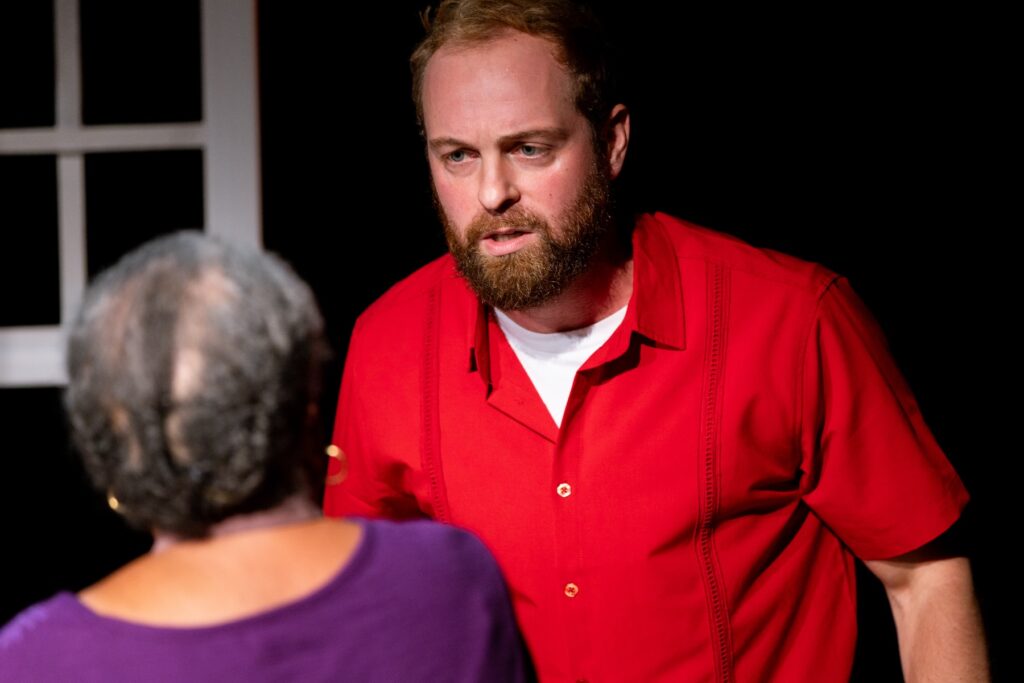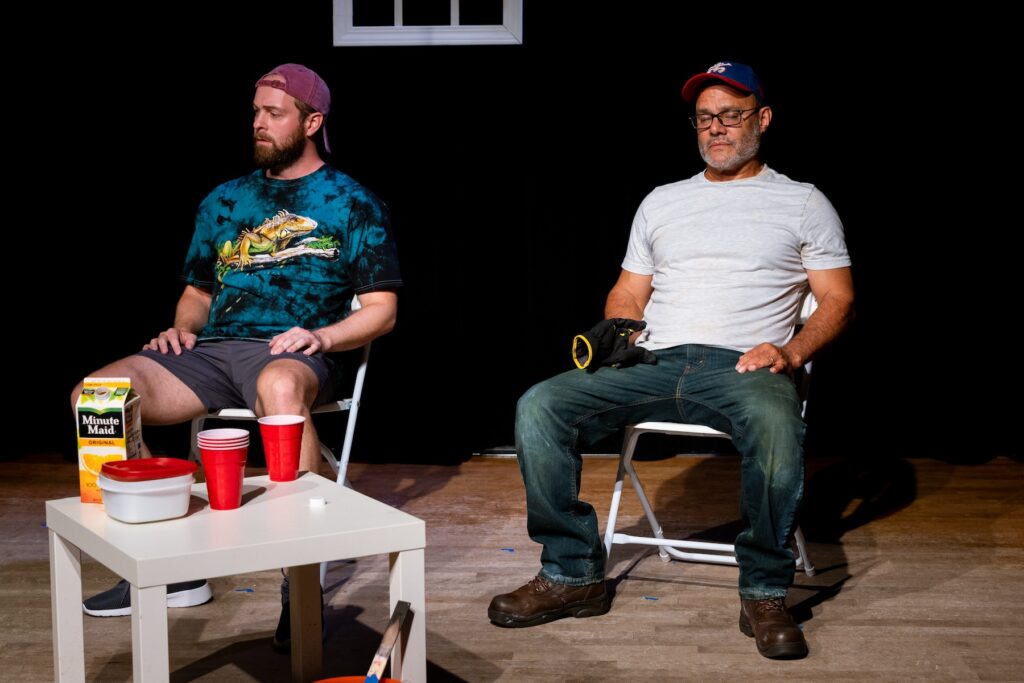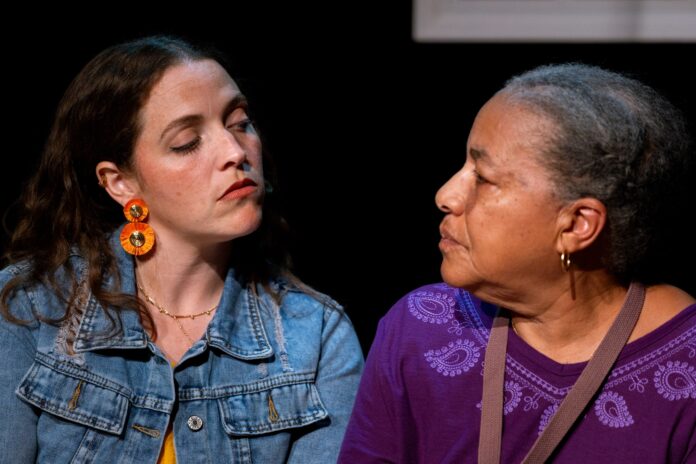If you’d told me at the start of the year that one of the “most San Francisco” shows I’d see would be set in Puerto Rico, I wouldn’t have known what you were talking about. Mind you, the show in question isn’t about San Francisco in any way, but its commentary about the US Caribbean commonwealth is so identical to the city in which I write these words that one could easily swap out the former for the latter with very little change in the narrative.
The play in question is Tere Martínez’s Paradise (or Paradi$e; world premiere through September 29 in the Brava Studio a Brava! for Women in the Arts, SF), a comedic drama about the US’ century-long hold over the tiny Latin American island: not granting it anything like statehood, but expecting it to immediately surrender its resources and workforce to whims of Uncle Sam.
That lackadaisical colonialism is personified by Julian (Chris Tilley), a wealthy white guy from the States who inherited an apartment building in the Santurce barrio of San Juan. As wealthy landlords often are, he’s frustrated with his poor tenants’ inability to pay the what-he-thinks-is-low rent on time. He makes it clear that he came to Puerto Rico to “escape,” so, the longtime residents’ calls for necessary building maintenance are just interruptions of his eat-pray-love time where he can practice yoga in peace.
As a bare minimum attempt to meet them halfway, he pays for private Spanish lessons with San Juan native Andrea (Dyana Díaz), a teacher tutoring Julian for extra cash in an increasingly expensive city. He picks up some phrases here and there from her lessons, but it’s immediately clear that he has eyes for her—and is confounded as to why she doesn’t feel the same. It could have something to do with the fact that Andrea is also an unabashed activist willing to call out Julian as a colonizer (to which he frequently rolls his eyes).
Whenever Julian isn’t brushing up on what little Spanish has stuck, he’s making room for repairman Quiko (Hector Lugo), who divides his time between Puerto Rico and the US to support his father, suffering from Long COVID. Quiko gives his all to the work Julian gives him, but his real concern is for Tata (Iris Diaz), the elderly diabetic whom Julian plans to evict. Julian claims that her care for local stray cats makes her a health hazard to the entire building, but how she’s meant to treat her health with no residence never occurs to him.

Even without such glaringly clear parallels to my own hometown, the white privilege of Julian would be frustrating in its realism. When Andrea calls him out on the debt and responsibility the US owes to Puerto Rico, Julian’s “up by your bootstraps” retort is the sort of condescending screed one’s learned to expect from the Elon Musks, Bilal Mahmoods, and Oprah Winfreys of the world who buy into the Ronald Reagan lie that poor people are poor by choice; that their inability to gain untold wealth is due to a lack of motivation rather than a system against them.
Yet, the trick to colonialism and imperialism thriving is that they become the norm. Andrea’s social justice ideals clash with those of traditionalist Tata, who has children and grandchildren in the US, one of whom is serving in the Middle East (the story takes place in 2022). Tata’s against reforms or island autonomy because she believes Puerto Rico would truly be lost without US rule. (“Thank God there’s a Walmart in Santurce!” she says.) Her inherent self-defeat echoes the “not my problem” ethos of Julian, the very man evicting her. “I’m a good guy,” he claims, “but I can’t be responsible for her.”
One of the most memorable moments comes near the end when Andrea, who recently ended a toxic relationship, laments that as proud as she is to fight for Puerto Rican autonomy, the fight is wearing her thin. Morally, she’s in the right, but talking to folks like Tata makes her feel alone in an uphill battle against a colonial force with limitless resources. That the ladies seem to only find common ground laughing at cars running over potholes, of which there are many, is one of the most grim jokes about wealth disparity you’ll come across.
As directed by Samuel del Rosario (aka Samuel Prince), the four-person ensemble gets a great deal of use out of their spartan set by Blanca Forzán. In Martínez’s own words, the quartet represents four of the most prominent ideologies of her home country: the greed of Julian; the “way it used to be” nostalgia of Tata; the desperate drive of Quiko (who’s chastised by Julian for arriving late, despite there being nothing Quiko could do about it); and the passionate progressiveness of Andrea.

They could easily fall into caricature, were it not for the way Martínez makes everyone’s myopia equally apparent. It’s hard to move toward a collective good when everyone’s been trained to “keep their eyes on the prize” and consider everyone around them an opponent.
I was pleasantly surprised to see COVID mentioned in the story; particularly, Long COVID, which is almost never mentioned, despite its devastating medical and economic impact. Still, we never see the characters actually wearing masks at any time. Yes, Andrea and Tata both keep surgicals on their wrists, but they’re never on their faces. Mind you, Puerto Rico’s vaccine rollout admirably triumphed over that of the US, but it’s 2024 and the pandemic isn’t over. Both the island and the mainland US still see record-high numbers of infections, deaths, and Long COVID developments. (Incidentally, legendary Brazilian musician Sérgio Mendes died of Long COVID the day before the show.)
There was no mask requirement for opening night of Paradise, and of the full house attending, I was once again possibly one-of-five-or-so patrons masked. Over the course of the one-hour show, my Aranet4’s CO² readings peaked around 1,491ppm in the Brava Studio, dropping to 1,443ppm for the final bow.
Even at a mere one hour, Martínez packs a lot of history and passion (and comedy) into a contemporary show about the lasting effects of empirical power on the general public. Much like another La Lengua production, Doméstica Realidad, it wisely avoids ending with blind optimism suggesting that all the characters’ problems would be solved by simply getting together and sharing a meal. As Andrea’s monologue about her past relationship reveals: there comes a point where someone is abused so often that it becomes the norm for them, but that doesn’t make it right. These are four perspectives of how that national abuse manifests itself.
Also like that other La Lengua production, this show is one of the best one’s I’ve seen for the theatrical year.
PARADISE’s world premiere runs through September 29 at the Brava Studio of Brava! for Women in the Arts, SF. Tickets and further info here.








